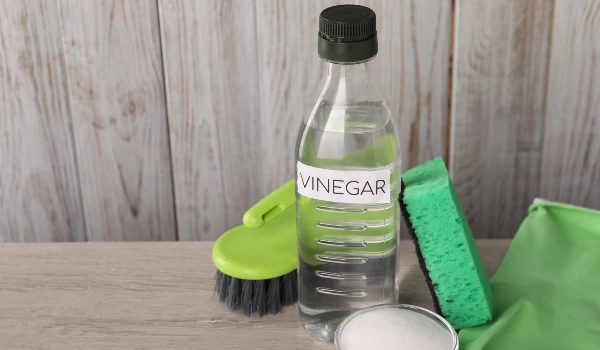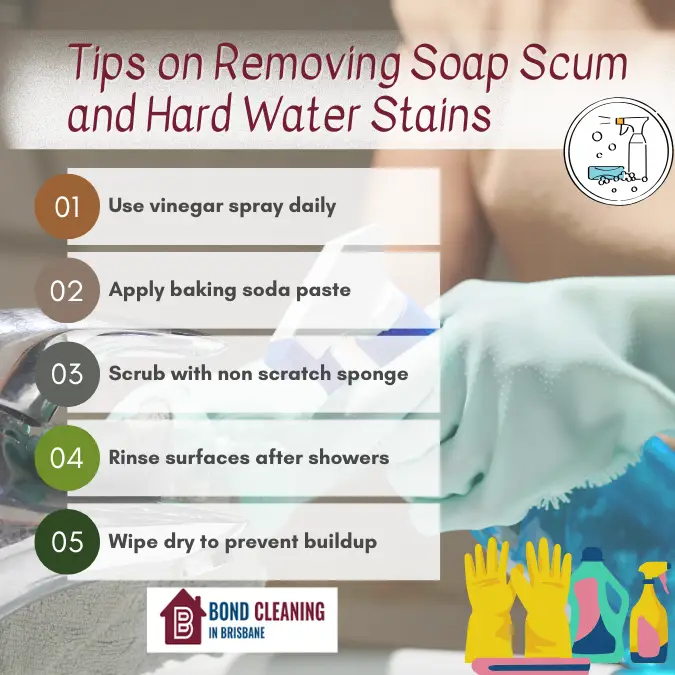
How To Remove Hard Water Stains And Soap Scum During Bond Cleaning In Brisbane
Brisbane’s mineral rich waters may be great for hydration, but it’s also the culprit behind those stubborn white streaks and cloudy film on your bathroom surfaces. When bond cleaning day arrives, these hard water stains and layers of soap scum can be the biggest threats to getting your full refund. Left untreated, they can cling to surfaces for months, dulling the shine of glass, chrome and tiles. And as any seasoned Brisbane renter knows, property managers have a sharp eye for the kind of grime that ordinary cleaning just doesn’t remove.
In this guide, you’ll learn simple, effective and inspection ready methods to tackle even the toughest bathroom build up. With the correct equipment, time and methods, getting rid of soap scum and hard water stains doesn’t have to be difficult. A trustworthy bond cleaning Brisbane firm, can also simplify and improve the efficiency of your move out routine. In short, this article will show you exactly how to restore your bathroom surfaces to their original sparkle so you can hand back your keys with confidence.
Hide
Show
- Use Vinegar to Break Down Mineral Deposits
- Create a Baking Soda Paste for Stubborn Stains
- Use a Vinegar and Dishwashing Liquid Mix for Soap Scum
- Soak Fixtures and Showerheads for Deep Descaling
- Scrub Grout with Hydrogen Peroxide and Baking Soda Mix
- Prevent Buildup with a Squeegee
- Use Glass Polish or Mineral Remover for Sparkling Finish
- Infographic: Tips on Removing Soap Scum and Hard Water Stains
- Wrapping Up
1. Use Vinegar to Break Down Mineral Deposits
White vinegar is one of the most effective natural cleaners, for dissolving the calcium and magnesium minerals that cause hard water stains. Spray undiluted vinegar generously over shower screens, taps, tiles or any area, where mineral build up is visible. Allow it to sit for at least ten minutes so the acidity can soften and break down the deposits.
Warm the vinegar a little before using it if the stains are very difficult to remove. This minor modification, improves the solution’s ability to penetrate mineral crusts. After the soaking period is over, gently scrub the glass or chrome surfaces with a non scratch sponge to prevent damage. To stop fresh streaks from appearing, thoroughly rinse with warm water and pat dry with a microfiber towel. This technique is particularly helpful, when you have a tight bond cleaning deadline and require quick results.
2. Create a Baking Soda Paste for Stubborn Stains
Some stains are so stubborn, that vinegar is insufficient. In these situations, a stronger reaction that lifts solidified deposits is produced, by combining vinegar and baking soda into a paste. Apply the paste directly to the stain, let it bubble for fifteen minutes and then scrub in circular motions. Professional bond cleaning Brisbane teams frequently utilise this method to remove tough buildup.
This technique works exceptionally well on shower screens, tiled walls, bathtubs and tap bases where water regularly settles. Baking soda’s mild abrasiveness makes it easier to cut through thick layers without scratching surfaces. Rinse the area well after scrubbing, to remove residue and expose a brighter clearer surface. Because it requires little work and yields noticeable benefits many renters rely on this approach.
3. Use a Vinegar and Dishwashing Liquid Mix for Soap Scum

Soap scum is formed when soap residues combines with minerals in the hard water, forming a sticky, filmy layer that does not dissolve easily. A solution of vinegar and dishwashing solutions, is a simple yet effective way to remove it. Combine equal portions in a spray bottle and generously apply, to the afflicted regions. Allow the mixture to stay for a few minutes before cleaning away with a moist cloth or sponge.
The vinegar loosens minerals while the detergent breaks down oils and fats from body products. This is particularly effective on shower walls, bath surfaces, and glass panels that have lost their shine due to cloudy scum. If you’re dealing with heavy scum build up, sprinkle baking soda onto the surface before spraying the mixture. The resulting foaming action lifts stubborn layers with ease.
4. Soak Fixtures and Showerheads for Deep Descaling
Taps, showerheads, and other fixtures often trap some of the worst mineral deposits because water flows and dries on their surfaces repeatedly. Wrapping tap bases in vinegar soaked cloths for twenty minutes is an excellent way to soften the build up before scrubbing with a toothbrush. For showerheads, place undiluted vinegar in a plastic bag and secure it around the fixture with a rubber band so the head is fully submerged. Let it soak for at least an hour.
Afterward, turn on the hot water to flush any loosened minerals from inside the nozzle. This leaves the showerhead looking newer and improves water flow; something many property managers check carefully. If you’re short on time, consider hiring seasoned bond cleaning Brisbane team, who utilise specialised descalers to tackle these tough locations.
5. Scrub Grout with Hydrogen Peroxide and Baking Soda Mix
Grout is one of the most difficult areas to clean, because it accumulates grime and minerals, causing apparent discoloration. Mixing baking soda and hydrogen peroxide is an extremely effective way for whitening grout. The combination lifts stains, kills bacteria, and restores the grout’s natural colour without damaging the surrounding tiles.
Apply the mixture directly onto the grout lines and allow it to sit for ten minutes. Use an old toothbrush or grout brush, to scrape softly yet thoroughly. Rinse the area thoroughly with warm water and dry the tiles with a cloth to prevent fresh mineral deposits from forming. This technique not only restores, the appearance of restrooms but also gives them a fresher, cleaner appearance overall.
6. Prevent Buildup with a Squeegee
Once you’ve removed the stains and scum, prevention is critical, especially if your inspection date is still several weeks away. One of the most basic practices is to use a squeegee to wipe water from shower screens and tiled walls after each usage. This keeps minerals from accumulating and eliminates the need, for extensive scrubbing later.
Switching from bar soap to liquid body wash, might also have a significant impact. Bar soaps frequently contain talc, a major contributor to soap scum but liquid soaps leave significantly less residue behind. Keep the bathroom thoroughly aired with exhaust fans or open windows to reduce moisture and mineral collection. Weekly wipe downs with a mild vinegar spray, will keep surfaces clean and reduce cleaning stress, as you near the end of your move out routine.
7. Use Glass Polish or Mineral Remover for Sparkling Finish
Once you’ve removed the bulk of hard water stains and soap scum, adding a finishing step can take the results from “clean” to “inspection level flawless.” A high quality glass polish or mineral remover is particularly effective for shower screens, mirrors, and chrome fixtures that still appear slightly dull even after deep cleaning.
Apply the product as directed by the manufacturer, often in circular motions with a microfibre cloth. This helps to eliminate microscopic mineral traces, restoring clarity and lustre. A final polish on chrome taps and shower frames, improves reflectivity and gives the bathroom a professional clean appearance. This extra step is especially useful during final lease preparations, as gleaming surfaces provide a good impression during inspections and prevent the possibility of cleaning related deductions.
Infographic: Tips on Removing Soap Scum and Hard Water Stains

Wrapping Up
Hard water stains and soap scum, can be frustrating challenges during a bond cleaning, especially in a city where mineral rich water is the norm. However, with the proper techniques and diligent cleaning you can return your bathroom surfaces to inspection ready condition. Whether you do it yourself or hire a professional, a clean, streak free bathroom increases your chances of collecting your bond refund with minimal worry.


